Swiss suspend treaty with Libya
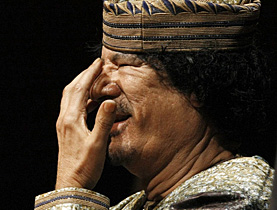
Switzerland's row with Libya took a new turn on Wednesday when the government announced that it was suspending a treaty aimed at normalising relations with Tripoli.
Libya’s “systematic refusal” to cooperate with Switzerland in the case of two Swiss businessmen who have been prevented from leaving the country for more than a year prompted the decision, a government statement said.
The government said that the two men had been “abducted in violation of international law”, and it is not known where they are currently being held. “The Libyan authorities are refusing all visiting rights,” the statement added.
It also said that the government would continue its “restrictive visa policy” towards Libyan nationals wishing to come to Switzerland.
The dispute stems from the 2008 arrest of a son of Moammar Gaddafi, Hannibal, and his pregnant wife who had come to Switzerland for the birth of their child. Geneva police briefly took the couple into custody on accusations they had abused their domestic staff while staying at a luxury hotel in the city.
After two nights in detention, they were released on bail and left the country. The staff were later compensated, and the charges were dropped. The bail money was returned.
Swiss President Hans-Rudolf Merz went to Tripoli in August and apologised for the arrest, triggering heavy criticism at home for doing so. During his visit he signed an agreement with the Libyan prime minister to normalise relations. However, the deadline for its terms to be met elapsed on October 20.
Since then speculation had been rife that Switzerland would change its strategy from that of quiet diplomacy which it had used up until that point.
Broad support
There has been cross-party support in Switzerland for the decision to suspend the treaty.
The rightwing People’s Party said the treaty was worthless, and that the move was therefore not a “revolution”.
Ueli Leuenberger, chairman of the Greens, hoped ministers had a common strategy for getting the Swiss nationals out of Libya.
The chairman of the foreign affairs committee of the House of Representatives, Geri Müller, described the suspension as a “logical and consistent step”, which showed that the government was following a strategy. He said he did not believe it would lead to a further escalation of the situation.
A spokesman for the ABB engineering giant, the employer of one of the two detained businessmen, declined to comment on the decision but said the company was kept constantly informed about the situation. He described the position of the two men as “extremely serious”.
Visa restrictions
Visa restrictions will hit numbers of well-to-do Libyans who frequently come to Geneva for medical check-ups in private clinics.
Despite belonging to the Schengen agreement, which enables holders of a Schengen visa to travel freely between member countries, Switzerland could refuse entry into its territory to all Libyan nationals.
Furthermore, member states have a right of consultation and veto over the allocation of Schengen visas, so that certain Libyans could be prevented from travelling anywhere in the Schengen area, which covers 25 countries in mainland Europe.
No apology
In a separate development, the minister in charge of Geneva police, Laurent Moutinot, broke his long silence about the matter on Wednesday, and issued a statement saying he would not apologise for Hannibal’s arrest, nor would he punish the officers involved because they had acted correctly.
He maintained that saying sorry would do no good anyway, referring to Merz’s apology that to date has proved to have little or no effect.
“One of the reasons why the struggle against domestic violence was too often neglected in the past has precisely to do with the fact that those who do it are strong and the victims are weak,” Moutinot wrote. “The state must establish a balance to avoid two-tier justice.”
In another aspect of the case which has infuriated the Libyans, namely the leaking of a police photo of Hannibal Gaddafi and its publication in some of the Swiss media, Moutinot said authorities were investigating and the person found responsible would face the punishment “they deserve”.
Failed obligations
Wednesday’s decision to suspend the agreement further complicates Switzerland’s tense relationship with Libya, which retaliated for Hannibal’s arrest by closing Swiss businesses in Libya, withdrawing assets from Swiss banks and cutting off flights between the countries.
The two businessmen were arrested on charges that they had violated visa regulations.
When Merz returned from Libya in August after meeting the prime minister, he believed he had received assurances that the two businessmen would be released by the end of the month. The Libyans said that was a misunderstanding and the release never happened.
The agreement the two men signed included a stipulation that an independent tribunal would be set up to look into the circumstances surrounding the detention of Hannibal and his wife.
Each country appointed a judge to investigate the matter. The two countries were then to jointly appoint a third judge within 60 days from signing the agreement. However, the third judge has not been named.
Merz met Libyan leader Moammar Gaddafi on the sidelines of the United Nations General Assembly in New York in September. Gaddafi promised to become “personally involved” in the case, encouraging brief hopes that the crisis could soon be resolved.
At the meeting Merz said he made it clear that relations could not be normalised unless the detained businessmen were released.
swissinfo.ch and agencies
July 15, 2008: Hannibal Gaddafi and his wife Aline are arrested at a Geneva hotel after reports that they have mistreated two servants. After two nights in detention, the couple are charged with inflicting physical injuries against the servants. The Gaddafis are released on bail and leave Switzerland.
July: Two Swiss nationals are arrested in Libya. Swiss businesses are forced to close their offices and the number of Swiss flights to Tripoli is cut. Bern sends a delegation to Libya.
January 2009: Talks are held in Davos with Seif al-Islam Gaddafi, one of the Libyan ruler’s sons. A diplomatic delegation travels to Tripoli.
April: Hannibal and his wife, along with the Libyan state, file a civil lawsuit against the Geneva authorities in a Geneva court.
May: Foreign Minister Micheline Calmy-Rey visits Libya, reporting “significant progress”.
June: Libya withdraws most of its assets from Swiss bank accounts.
August: Merz, who meets the Libyan prime minister but not Gaddafi, apologises in Tripoli for the arrest. Swiss appoint arbitrator for international tribunal.
September: Libya does not let the two Swiss nationals leave the country, breaking a promise made to Merz that they would be free to return to Switzerland before September 1. Libya names its representative for the tribunal. Gaddafi and Merz meet on the sidelines of the UN General Assembly in New York. The two nationals disappear after undergoing a medical check-up in Tripoli.
October: A Swiss delegation returns empty-handed from Tripoli. A 60-day limit for normalising relations between Switzerland and Libya passes with no sign of the two Swiss hostages held by Tripoli. The Swiss cabinet expresses irritation over Libya’s “systematic refusal” to implement agreements between the two countries.
November: Swiss ministers suspend treaty seeking to normalise relations with Tripoli and say they will pursue visa restrictions for Libyans.

In compliance with the JTI standards
More: SWI swissinfo.ch certified by the Journalism Trust Initiative
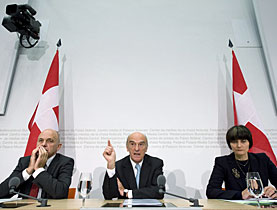
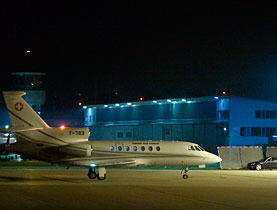
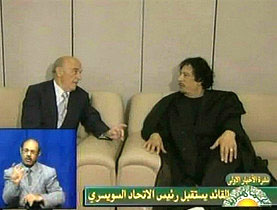
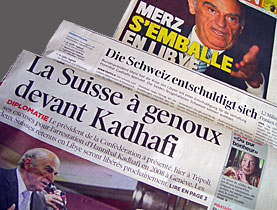
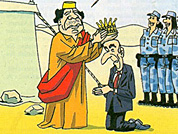
You can find an overview of ongoing debates with our journalists here. Please join us!
If you want to start a conversation about a topic raised in this article or want to report factual errors, email us at english@swissinfo.ch.